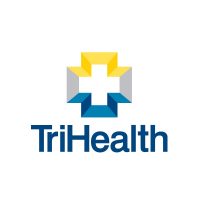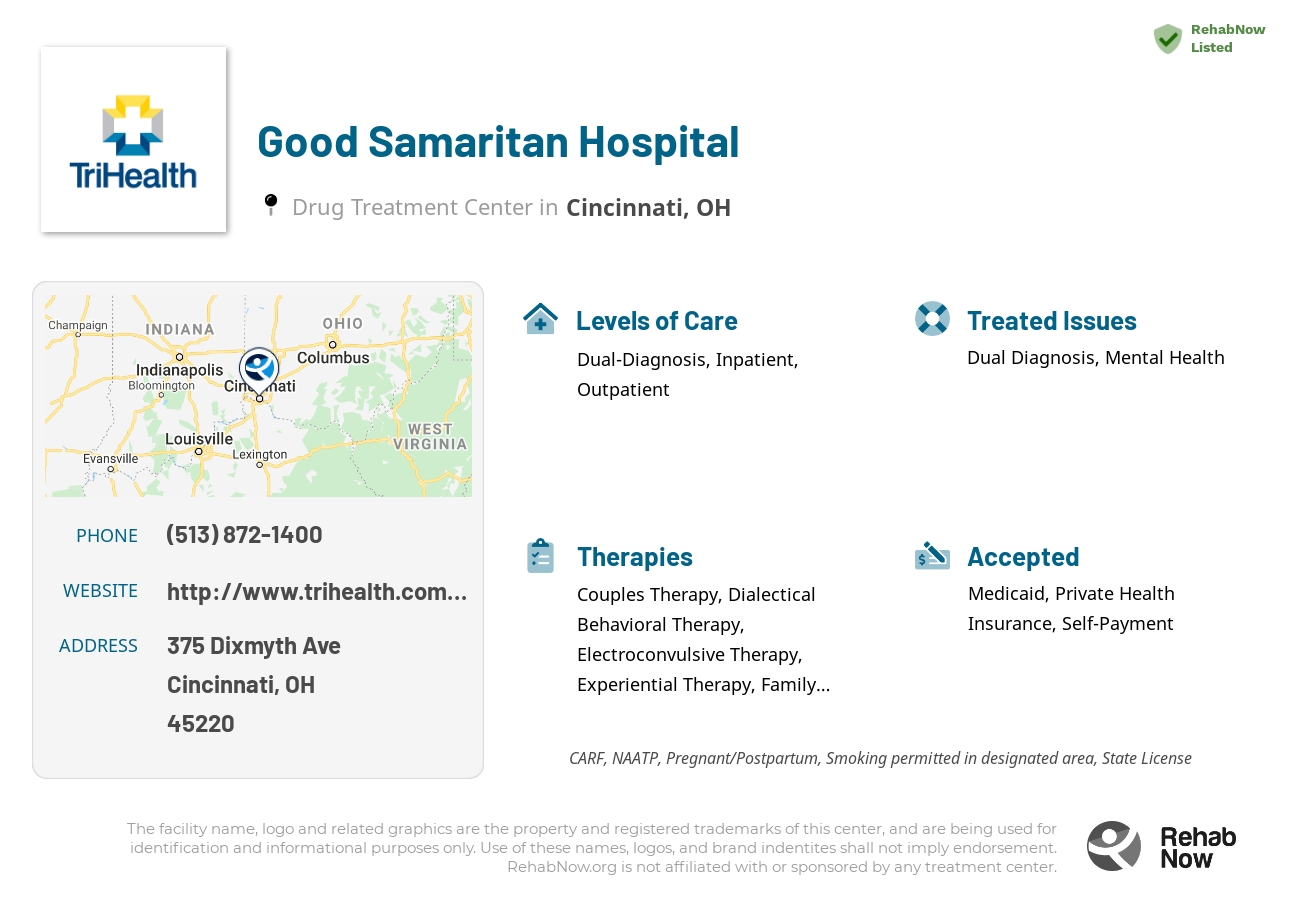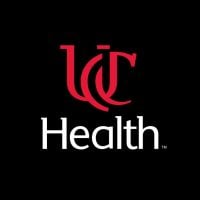Good Samaritan Hospital
Drug Rehab Center in Cincinnati, Ohio
Good Samaritan Hospital in Cincinnati specializes in treating mental health issues and addictions with a holistic approach, using a range of personalized treatments including therapy, nutrition therapy, and trauma therapy on both an inpatient and outpatient basis, and accepting private health insurance.
About This Cincinnati, OH Facility
Good Samaritan Hospital in Cincinnati, Ohio is an addiction treatment facility specializing in Dual Diagnosis and Mental Health. They treat patients of all ages with various addictions and disorders, providing comprehensive inpatient, outpatient, and aftercare support levels of care. Good Samaritan Hospital is also fully accredited and licensed with private health insurance coverage.
Good Samaritan Hospital offers a wide range of addiction and substance abuse services that are tailored to each individual’s needs. Their inpatient and outpatient programs provide evidence-based treatments such as psychotherapy, medication-assisted treatment, individual therapy, family therapy, and group therapy. They also offer a variety of educational and recovery-focused sessions that help connect individuals to essential resources and support. Additionally, Good Samaritan Hospital is committed to providing the highest standard of care, evidenced by their fully accredited and state-licensed facility.
Genders
Ages
Modality
Additional
Conditions and Issues Treated
Substance use disorder falls under two categories: Alcohol or Drug Abuse and Drug Dependence. An individual suffering from a substance use disorder and mental health disorders is said to have a co-occurring disorder or a dual disorder. Individuals in Cincinnati, OH with substance use disorders and mental health problems are said to suffer from a ‘dual diagnosis’.
The most frequently identified mental health issues found in individuals with substance use disorders include anxiety, depression, schizophrenia, and schizoaffective disorder.
Levels of Care Offered
This center offers a variety of custom treatment tailored to individual recovery. Currently available are Dual-Diagnosis, Inpatient, Outpatient, with additional therapies available as listed below.
Inpatient rehab programs like what’s offered at Good Samaritan Hospital in Cincinnati, OH are ideal for covering all the bases that surround one’s addiction. It’s considered the most comprehensive approach to care for people afflicted with addiction. Patients live in a facility where they have access to therapy and medical care 24/7.
Outpatient treatment is treatment that occurs when a patient is not checked into a rehab facility. The patient may show up for therapy sessions, go through detox and engage in other therapies to help them recover. However, they will do so while they live at home in Ohio.
Outpatient therapy provided by Good Samaritan Hospital is usually recommended as a follow up to inpatient therapy. It helps patients adapt to their normal lives after treatment. In some cases, it can also be an alternative to inpatient treatment. People may choose this route if they are unable to leave their jobs, children or if they don’t have the money for inpatient treatment. However, inpatient treatment is the best way to recover from addiction.
Good Samaritan Hospital‘s Therapies & Programs
Individual therapy aims to identify the core issues that would have led the patient to substance abuse and address the root cause effectively. Patients find the therapist as a person who they can trust. It helps them to open up and discuss personal and sensitive issues, which they may not be comfortable discussing in a group.
Couples therapy is an approach wherein the patients and their partners are engaged together as a part of the treatment process. When a person becomes a victim of substance abuse, it affects the patient and the people around him, particularly his partner. Their relationship can become strained due to lack of communication, financial issues, loss of trust, lack of intimacy, and physical abuse in more severe cases.
Couples therapy addresses these issues and tries to rebuild the trust between the partners. The partner’s involvement in the process will result in greater chances of treatment success and sustained recovery.
Family therapy is a set of therapeutic approaches that assumes that the entire family is a system. It utilizes the strengths and resources of the family to help the patient refrain from resorting to substance abuse. It helps to repair relationships and improve communication between family members.
Group therapy happens at Good Samaritan Hospital in a controlled group environment, as opposed to a one-on-one setting. It supports Cincinnati, OH patients’ recovery by offering a sense of comfort and letting them know that they are not alone. Through shared conversations, patients also learn to develop faith and understanding and gain insight on their addictions.
Unresolved trauma is often a key reason why many patients resorted to substance abuse. Trauma therapy refers to treatment wherein specialist therapists help the patients to resolve the trauma that led the patients to substance abuse. The trauma could be physical abuse, sexual abuse, war, natural disasters, divorce, accident, loss of a loved one, etc. Thinking of these traumatic events causes emotional disturbances like anxiety, depression and results in addiction. If trauma is the primary cause of substance abuse, then both issues must be addressed. Otherwise, there is a risk of relapse. Trauma therapy also improves the cognitive functions and provides long term benefits.
Dialectical Behavior Therapy (DBT) is an improved version of Cognitive Behavioral Therapy (CBT). DBT is a treatment of choice for people suffering from self-harming behaviors characterized by cutting and suicidal thoughts or inclinations.
This treatment is developed to help individuals recognize their thought patterns, behaviors, and feelings. It has demonstrated its effectiveness for people that are finding it difficult to control their emotions and urges. Conditions such as obsessive-compulsive disorder and borderline personality disorder also benefit from DBT as it imparts individuals stress-management techniques and enhanced self-esteem so they can sustain their sobriety by reducing the impact of triggers and out-of-control emotions.
Cognitive behavioral therapy (CBT) is a way of addressing concerns through talking. It can be used in individual counseling sessions. Talking through issues with professionals at Good Samaritan Hospital can identify sources of discomfort or unhealthy thoughts. It is a way of learning about yourself and your individual perceptions. CBT is a healthy way of addressing some behaviors which may be bringing unintended consequences in your life.
Nicotine replacement therapy (NRT) is a treatment that helps people to quit smoking. NRT reduces the withdrawal symptoms by giving nicotine in low doses. It is safe for most adults, teens and pregnant women should not undergo NRT. Research shows that the use of NRT doubles the chances of quitting smoking.
Patient Experience
Experiential Therapy at Good Samaritan Hospital
Experiential therapy works on the principle that the perception of individuals determines their behavior. It is different from medication and talk therapy and suits those who have difficulty in expressing themselves and interact. Experiential therapy works by using tools and activities to recreate past experiences and encourages the release of suppressed thoughts that were responsible for the negative feelings and drug addiction.
Role-playing, arts and crafts, music, animal care, rock climbing, etc. are some of the activities used in this therapy. Gradually the individual will experience calmness and love and change their perception positively. Other than drug addiction, Experiential therapy is useful in various behavioral and eating disorders.
Payment Options Accepted
For specific insurance or payment methods please contact us.
Is your insurance accepted?
Ask an expert, call (888) 674-0062
Additional Details
Specifics, location, and helpful extra information.
Cincinnati, Ohio 45220 Phone Number(513) 872-1400 Meta DetailsUpdated November 25, 2023
Staff Verified
Patient Reviews
There are no reviews yet. Be the first one to write one.
Cincinnati, Ohio Addiction Information
Ohio is suffering from a drug abuse problem that is costing thousands of its residents their lives every single year. Opioids, particularly Fentanyl and heroin, are the leading drugs in the state. The state ranks in the top 10 for illicit use of painkillers. Opioid-related overdose rates in Ohio are by far some of the highest in the country.
In Cincinnati, OH, more than 400 drug-related deaths were in 2016. There were over 5 million drug prescriptions written in 2015. This is a 20% increase from 2010. Drug addiction and abuse can lead to crime and violence and harm public health. Inpatient treatment facilities provide around-the-clock care and supervision. 12-step programs, such as Alcoholics Anonymous or Narcotics Anonymous, are widely available in Cincinnati.
Treatment in Nearby Cities
- Saint Clairsville, OH (203.6 mi.)
- Caldwell, OH (165.9 mi.)
- Hilliard, OH (95.4 mi.)
- Westerville, OH (108.8 mi.)
- Coldwater, OH (92.8 mi.)
Centers near Good Samaritan Hospital
The facility name, logo and brand are the property and registered trademarks of Good Samaritan Hospital, and are being used for identification and informational purposes only. Use of these names, logos and brands shall not imply endorsement. RehabNow.org is not affiliated with or sponsored by Good Samaritan Hospital.











